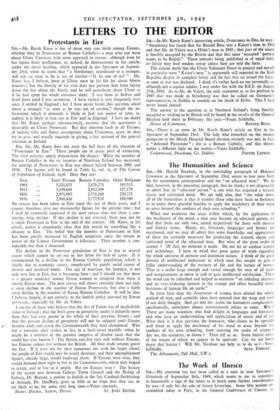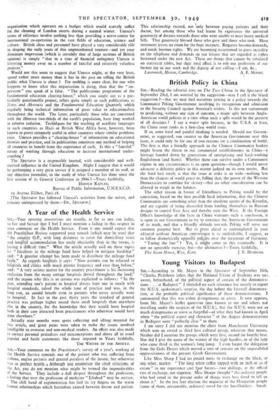The Work of Unesco
SIR,—My attention has just been called to a note in your Spectator's Notebook of September 16th, 1949, which seems to me to constitute so lamentable a sign of the times as to merit some further consideration by you—if only for the sake of future historians. Some fifty nations arc assembled today in Paris, in the General Conference of Unesco, an
organisation which operates on a budget which would scarcely suffice for the cleaning of London streets during a normal winter. Unesco's terms of reference involve nothing less than providing a nerve-centre for international co-operation in the vast fields of education, science and culture. British ideas and personnel have played a very considerable role in shaping the early years of this unprecedented venture—and yet your dominant impression (which is certainly that of large sections of British opinion) is simply " that in a time of financial stringency Unesco is frittering money away on a number of fanciful and relatively valueless projects."
Would not this seem to suggest that Unesco might, at the very least, spend rather more money than it has in the past on telling the British public what Unesco is about ? For nothing is more clear, for one who happens to know what this organisation is doing, than that the " im- pression" you speak of is false. " The publications programme of the fundamental education clearing-house," which you single out as a par- ticularly questionable project, refers quite simply to such publications as Notes and Abstracts and the Fundamental Education Quarterly which regularly bring technical information of great value to educationalists throughout the world. The latter, particularly those who arc concerned with the illiterate two-thirds of the earth's population, have long worked in relative isolation. Teclihlques for the teaching of auxiliary languages in such countries as Haiti or British West Afrita have, however, been known to prove extremely useful in other countries where similar problems exist. Unesco provides a "clearing-house" of information on educational theories and practice, and its publications constitute one method of helping all countries to benefit from the experience of each. Is this a " fanciful " means of working through education to increase international under- standing ?
The Spectator is a responsible journal, with considerable and well- merited influence in the United Kingdom. Might I suggest that it would be performing a very great service if it assigned a member of its staff, or any objective journalist, to the study of what Unesco has done since the first session of its General Conference in 1946 ?—Yours faithfully, HAROI.D KAPLAN,
Bureau of Public Information, U.N.E.S.C.O. 19 Avenue Kliber, Paris 16.
[The Spectator has followed Unesco's activities from the outset, and remains unimpressed by them.—En., Spectator.]















































 Previous page
Previous page